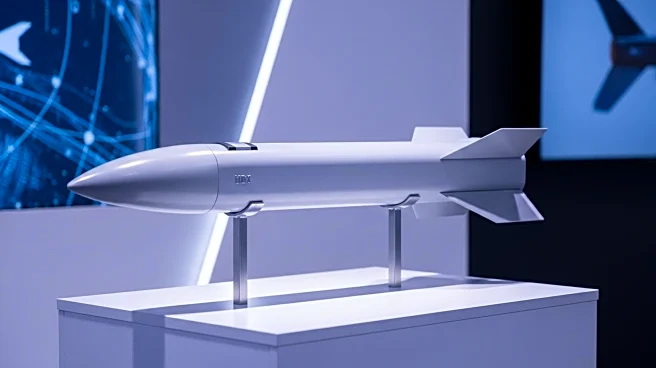What's Happening?
Rheinmetall has introduced a new air-to-air missile designed for drone self-defense at the Drone Days 2025 event in Germany. The missile is part of a system integrated into the Primoco One 150 reconnaissance drone, which is manufactured by Czech company Primoco. This drone can fly up to 1,800 kilometers and stay airborne for six to eight hours, carrying a payload of 30 kilograms. The missile, developed by Rheinmetall, is intended to protect drones from interceptors and helicopters, with a flight time of five minutes and a speed of 600 kilometers per hour. The system also includes three HERO R-20 loitering munitions, which are autonomous and feature a seeker head, with future variants planned to include laser guidance.
Why It's Important?
The development of air-to-air missiles for drone self-defense marks a significant advancement in drone technology, potentially enhancing the operational capabilities of drones in military and surveillance applications. This innovation could lead to increased drone deployment in conflict zones, providing enhanced protection against aerial threats. The partnership between Rheinmetall and U.S.-based Anduril, focusing on cruise missiles and combat drones, indicates a growing interest in expanding drone capabilities in the European market. This could have implications for defense strategies and military procurement, influencing how countries equip their forces to handle modern aerial threats.
What's Next?
Rheinmetall plans to begin flight tests of the new missile system later this year, which could lead to further refinements and eventual mass production. The company is also considering taking on the assembly of the Primoco drone and system integration if there is sufficient demand. As the technology progresses, stakeholders in the defense industry may need to evaluate the integration of such systems into their existing frameworks, potentially leading to new procurement strategies and defense policies.
Beyond the Headlines
The introduction of drone self-defense systems raises ethical and legal questions regarding the use of autonomous weapons in warfare. As drones become more capable of defending themselves, the rules of engagement and international laws governing drone warfare may need to be revisited. Additionally, the technological advancements in drone capabilities could lead to shifts in military tactics and strategies, emphasizing the importance of air superiority and electronic warfare.









